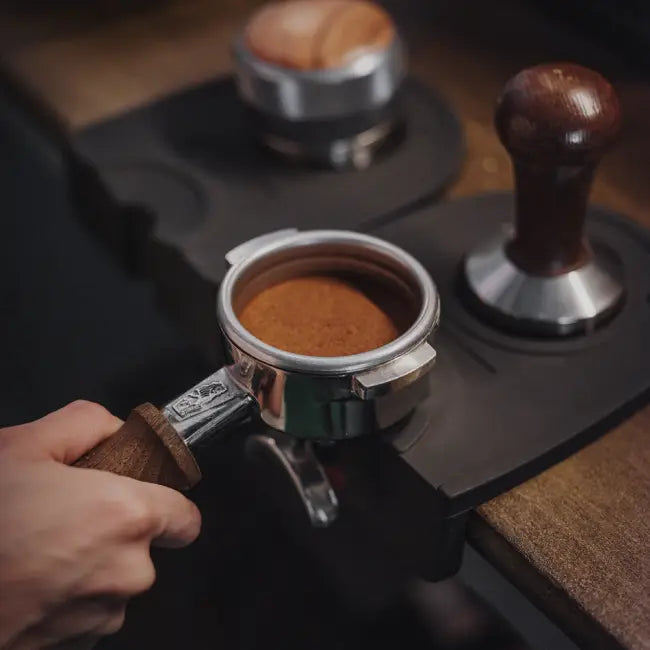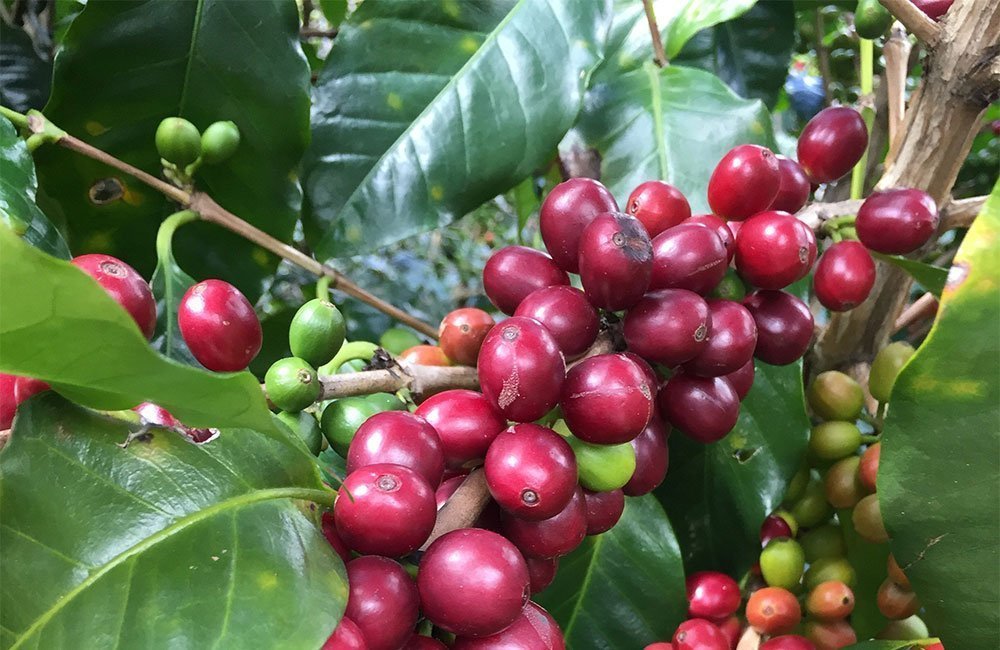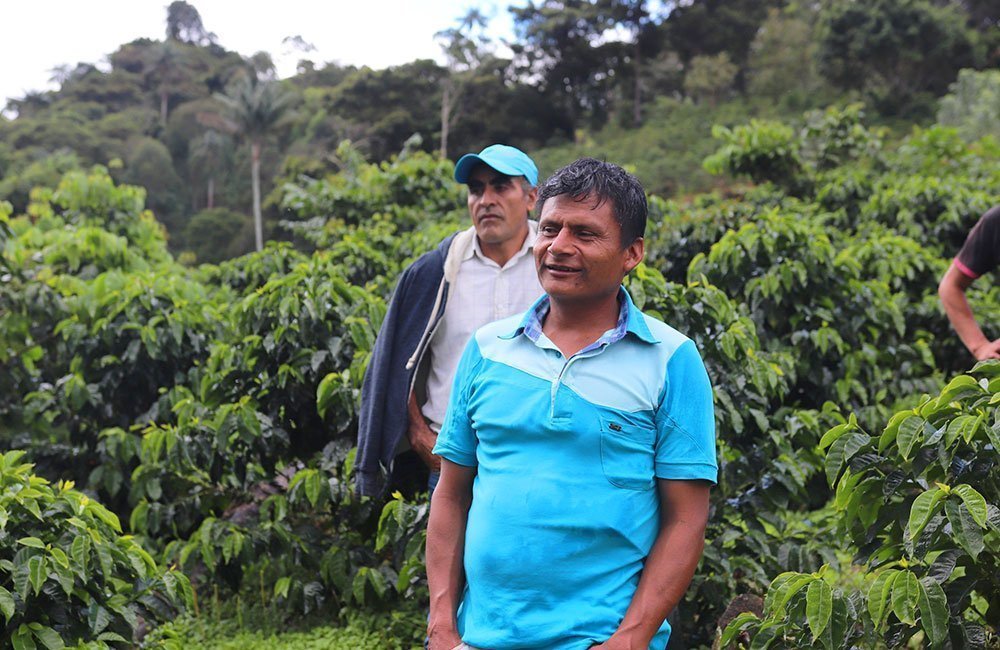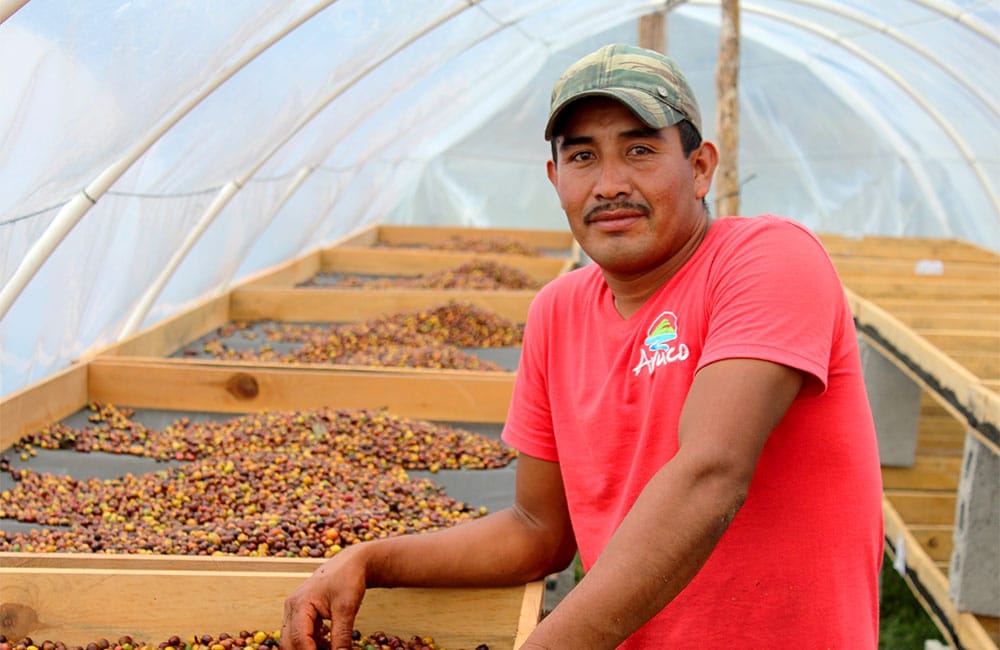San Francisco
Praliné, chocolate, albaricoque
Tarrazú |
|
1.750 msnm. |
|
Caturra & Catuai |
|
Lavado |
|
Edgar Fallas & familia |

San Francisco equilibrado y dulce de la Cordillera Central de Costa Rica
La finca San Francisco se encuentra en el distrito del mismo nombre, San Francisco, de la “Cordillera Central” también llamada “La Zona de los Santos”.
Esta finca es propiedad de Edgar Fallas Solís, su esposa Ligia y su hijo Willian. La familia posee entre 10 y 12 hectáreas de café intercalado con aguacates, cítricos y bananos.
La finca está dividida en diferentes parcelas que culminan entre 1.400 y 2.000 m.
Edgar es la segunda generación que trabaja en esta finca de 55 años plantada originalmente con Caturra y con la incorporación más tarde de Catuai y Catimore.
Consiguen plántulas del centro nacional de investigación Icafé. Actualmente el plan de fertilización es 50/50 orgánico y químico, pero a Edgar le gustaría hacerlo 75/25.
Proteger el medio ambiente es muy importante para él. Se utilizan muchas técnicas biodinámicas en la granja (uso de ajo, chile, cultivos intercalados, etc.).
Edgar es muy consciente del cambio climático y de la necesidad de adaptar su agricultura.
En plena temporada, 15 personas trabajan con la familia ayudando con la cosecha.
Edgar y su familia son miembros de Asoproaaa Coop, donde se procesan los micro lotes para garantizar la calidad y la consistencia de los lotes.

El café de Biftu Gudina es procesado usando el método lavado. Una vez en la estación de lavado, los frutos son clasificados a mano y se descartan los frutos inmaduros o excesivamente maduros antes de pasarlos por la máquina despulpadora ‘eco-pulper’ Penagos (esta máquina ayuda a reducir el uso de agua excesivo). A continuación, los granos se dejan en remojo durante unas 8 horas. El tratamiento de aguas residuales de la cooperativa se basa en una forma natural de filtración a través de una parcela de pasto vetiver antes de pasar por los pozos y finalmente a la tierra. A continuación, los granos se secan al sol durante 10 a 14 días en camas africanas elevadas y se vuelven a clasificar cuidadosamente a mano.
La familia mide el contenido de azúcar en las cerezas utilizando un medidor de Brix para saber cuándo cosechar (entre 21 y 28, dependiendo de la variedad que se cosecha).
Willian, hijo de Edgar, se formó durante 4 años en brewing y ahora está compitiendo, llegando a ganar un campeonato nacional.
Willian sabe mucho sobre la cadena cafetera y calidad del café y se hará cargo de la finca cuando su padre se retire.
Asoproaaa es una asociación que cuenta con 1.000 socios, pero solo 300 son productores de café (los otros 700 son parte de otros programas de la asociación: cítricos, ganado, etc.).
El tamaño promedio de las fincas de los pequeños productores es de 5 ha para una producción de 50 quintales (46,5 kg de verde) por ha.
Las variedades cultivadas son principalmente Red & Yellow Catuai y Caturra, pero también Typica y Geisha.
La asociación es un importante centro agrónomo para los pequeños productores de la región y les permite el acceso a crédito.
Los miembros no necesitan traer todo su café a la cooperativa, Asoproaaa se especializa en micro lotes y se asegura los mejores lotes de la región pagando precios más altos.

El café de Biftu Gudina es procesado usando el método lavado. Una vez en la estación de lavado, los frutos son clasificados a mano y se descartan los frutos inmaduros o excesivamente maduros antes de pasarlos por la máquina despulpadora ‘eco-pulper’ Penagos (esta máquina ayuda a reducir el uso de agua excesivo). A continuación, los granos se dejan en remojo durante unas 8 horas. El tratamiento de aguas residuales de la cooperativa se basa en una forma natural de filtración a través de una parcela de pasto vetiver antes de pasar por los pozos y finalmente a la tierra. A continuación, los granos se secan al sol durante 10 a 14 días en camas africanas elevadas y se vuelven a clasificar cuidadosamente a mano.
Las mediciones de Brix se toman antes del procesado del café y ayudan al equipo a tomar decisiones sobre cómo abordarlo. Se utilizan patios y camas africanas.
El secado se detiene cuando el café alcanza un contenido estable de humedad del 10.5%. El trillado se realiza en la misma finca y las bolsas salen del almacén solo cuando están listas para la exportación.
A pesar de la drástica reducción en la producción de este año, Asoproaaa se beneficia de la baja competencia y de la muy buena reputación que tiene entre los agricultores.
Por lo tanto, han mantenido su volumen esta temporada. Las calidades más bajas obtenidas después de la clasificación se tuestan y se empaquetan para su venta al mercado local.
La asociación ha llevado a cabo un programa de vivienda durante los últimos 15 años con más de 1.400 casitas que se han construido para las personas más necesitadas de la comunidad.

El café de Biftu Gudina es procesado usando el método lavado. Una vez en la estación de lavado, los frutos son clasificados a mano y se descartan los frutos inmaduros o excesivamente maduros antes de pasarlos por la máquina despulpadora ‘eco-pulper’ Penagos (esta máquina ayuda a reducir el uso de agua excesivo). A continuación, los granos se dejan en remojo durante unas 8 horas. El tratamiento de aguas residuales de la cooperativa se basa en una forma natural de filtración a través de una parcela de pasto vetiver antes de pasar por los pozos y finalmente a la tierra. A continuación, los granos se secan al sol durante 10 a 14 días en camas africanas elevadas y se vuelven a clasificar cuidadosamente a mano.









